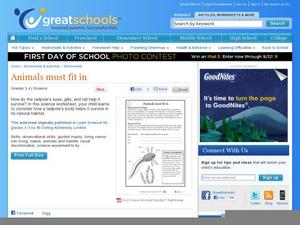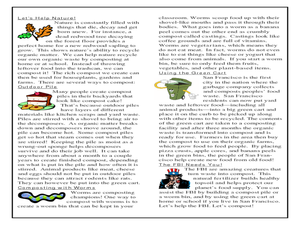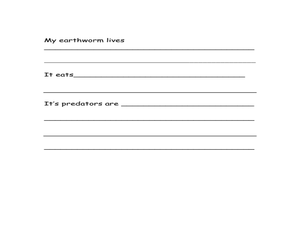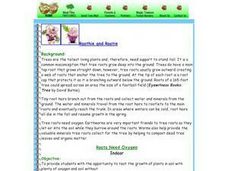Curated OER
Sensational Seaweed
Students compare kelp and land plants. In this sea plant lesson, students look at the role of algae in aquatic environments. They research the properties of kelp and explore seaweed.
Curated OER
Animals Must Fit In
A instructional activity on tadpoles is here for your young biologists. Learners read a short paragraph on tadpoles, then answer three questions regarding how parts of their bodies help the tadpole to survive in the pond. There is a good...
PBS
Cloud Clues
It's cloudy with a good chance of learning! An inquiry-based lesson begins with an exploration of transparent, translucent, and opaque materials. Young scientists then connect their learning to the different cloud types as they take the...
PBS
Twirling in the Breeze
Blow classes away with a hands-on lesson investigating wind speed. Learners use common materials to design and construct anemometers. They then test their anemometers and collect data on the wind speed created by a fan.
Curated OER
Slash Trash! Reducing, Reusing and Recycling Our Way to Zero Waste
The other "Three Rs" are covered in this lesson: reduce, reuse, and recycle. Over four weeks, conservationists collect data about waste in their own homes. They combine their findings with those of other young scholars in order to...
Curated OER
Food chains and webs
Here is an extremely simplistic look at food chains and webs. It depicts three different food chains, each containing a plant, plant eater, and meat-eater. Learners fill in the missing part of each chain by using the images provided at...
Curated OER
Let's Build a Worm Bin
Students explore the process of decomposition. In this ecology and measurement lesson, students prepare a worm home to be used for vermicomposting. Students weigh a group of worms and the added food, recording this information on a data...
Curated OER
Reduce Reuse Recycle
Students discover methods that can save the planet by recycling. In this sustainable planet lesson, students read The Berenstein Bears Don't Pollute Anymore, and practice memorizing the 3 R's. Students write commitment letters...
Curated OER
Contrasting Landscapes - UBC Farm Field Trip
Students visit the UBC Farm. In this lesson plan on various landscapes, students spend a day at the University of British Columbia exploring the farm and trail adjoining the campus. This lesson plan could be modified for use in any...
Curated OER
Earth Day - Bursting Beans
Young scholars fill jars with dried beans and water, cover the jars, and wait to see what happens in this excellent Science experiment ideal for Earth Day (April 22nd). Emphasis is placed on discovering the reactions of seeds to water.
Curated OER
Decomposers- Nurse Logs
Learners investigate temperate forest ecosystems. In this environmental instructional activity, students discover different forms of decomposition and its effect on the environment.
Curated OER
Earthworms and Making a Wormery
Students explore the environment by researching insects. In this earthworm instructional activity, students utilize soil and plexiglass to build a see through wormery in which students can observe the worms at work. Students identify the...
Curated OER
Roots Need Oxygen
Pupils investigate the growth of plants in soil with oxygen and soil without oxygen. They discuss what roots need to survive, and chart the growth of two plants to analyze the difference between plain soil and soil with two earthworms.














